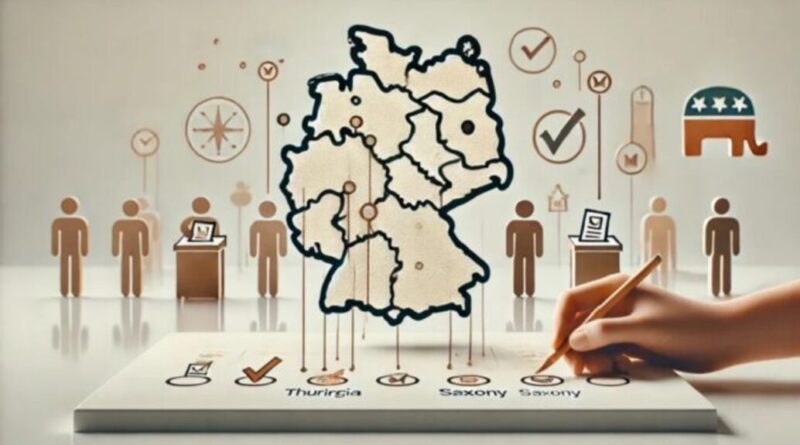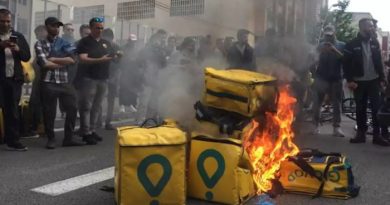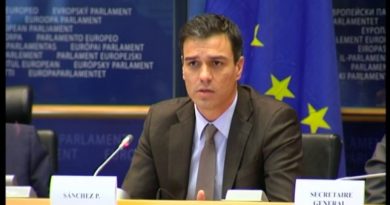State elections in Thuringia and Saxony: continue the right turn
Authors: Valentin Lambert/Susanne Kühn
Members of the Arbeiter Group:innenmacht – German Section of the League for the Fifth International.
Election results in Thuringia and Saxony, two East German states are no surprise, but a very serious warning for the German working class and the left. In Thuringia the result is the following: the far-right party Alternative for Germany (AfD): 32,8 % (+9,4), the conservative Christian Democratic Union (CDU) 23,6 % (+1,9), Sahra Wagenknecht's new populist BSW party (Movement Sahra Wagenknecht = Movimiento Sahra Wagenknecht) 15,8 % (+15,8), the left-wing party DIE LINKE 13,1 % (-17,9), the Social Democratic Party (SPD) 6,1 % (-2,1), The Greens 3,2 % (-2,0) and the liberal FDP 1,1 % (-3,9). in Saxony, the result is the following: CDU: 31,9 % (-0,2 %), AfD: 30,6 % (+3,1 %), BSW 11,8 % (+11,8), SPD 7,3 % (-0,4), Verdes 5,1 % (-3,5), THE LEFT 4,5 % (-5,9), FPD con 0,9 % (-3,6).
Three electoral winners
In both federal states there are three electoral winners. First, Of course, el AfD, which became the strongest party in Thuringia and came second in Saxony. In both federal states, was able to mobilize above all previous non-voters. Racism and right-wing populism do not deter anyone, Unlike: have long been acceptable in both states.
Most AfD voters are no longer simply protest voters, the far-right party has indeed established a significant social base. This is even more alarming, since in Thuringia and Saxony, the most right-wing and semi-fascist elements such as Björn Höcke dominate the party and will further increase their influence at the national level. further, the AfD's voter base not only includes the petite bourgeoisie and small businesses oriented to the domestic market, but now it has become the strongest party among manual workers and young people.
Secondly, The CDU managed to hold on in both states and even made slight advances in Thuringia. He will likely be able to lead the government in both states in the future and continue to gain momentum for the federal elections. Its only drawback is that it will not be able to prevent the participation of the BSW in the government in both states..
Not Turing, even a CDU government, the BSW and the SPD will only have 44 of the 88 seats in parliament and the opposition can block any law. On the other hand, it is very possible that such a government will reach agreements with DIE LINKE or even the AfD. At least the CDU and the BSW could be prepared for this on some issues.
In third place, The BSW has a good chance of entering government as a coalition partner of the Conservatives in both states. The political will of Wagenknecht and company is not lacking, as the first interviews on election night showed. Although these negotiations will be difficult with the war in Ukraine, where Wagenknecht maintains in practice a pro-Russian camp position, There is broad agreement with the conservatives and the SPD on the demand for even stricter immigration laws and the strengthening of "public order".
The losers
The losers are equally clear. As in 2019, the SPD fell short of the 10 percent in both states. The Greens barely managed to enter the state parliament in Saxony, but they will no longer be represented in Thuringia. The only pleasing result from a left perspective in these elections was the devastating performance of the FDP, which only achieved about one percent. DIE LINKE suffered the expected disaster. In both federal states of the country it lost more than half of its voters in absolute terms and around two thirds of its electoral quota..
What does the result mean?
Beyond the two federal states, The result also has great importance for national politics.
Turn to the right and referendum in favor of racism
The results not only consolidate the turn to the right at the national level in recent years. After the Solingen murders, a real wave of hysteria and racist agitation spread throughout the country, which led to new restrictions on the right to asylum, stricter border controls and easier deportations. Just two days before the elections, The federal government agreed to new restrictions on asylum and new security laws.
At large public events such as sports competitions or festivals, carrying knives will be absolutely prohibited, The same could be extended to so-called “crime locations.”, such as train stations or bus terminals. Secondly, surveillance will be expanded (assumptions) Islamists and "terrorists". In third place, Economic and social aid will be cut for immigrants who have entered the EU through other States. In the future, These States should be forced to welcome these immigrants and pay them housing and minimum income. By last, Refugees will be deported to countries like Afghanistan and Syria.
Although the conservative CDU/CSU, The AfD and the BSW support these measures and do not fail to point out that the government has accepted some of their demands, they want more. The AfD wants a full-fledged racist program to fight organized crime.
The federal government is expelling millions of people from Germany. The CDU/CSU and the other two parties demand permanent immigration controls and forced returns at the borders, which in fact means a suspension and negotiation of the Schengen agreements.
The results in Thuringia and Saxony also represent a kind of racist plebiscite, in which only the parties that attack the coalition government from the right on immigration and refugee issues could win. The defeats of the ruling SPD parties, Greens and FDP, that in recent years they have repeatedly taken up the racist demands of the right make it clear that there is no point in accommodating the AfD and the CDU (and more recently also to the BSW). Racist voters always prefer to vote for the right-wing or conservative original rather than the green-liberal-social democratic copy.
Punishment of the federal government
But there is another reason for the defeats of the ruling parties: the policy of the national government itself. Even during the election campaign, The content of state policy increasingly gave way to debates about the coalition government's shortcomings in federal policy..
The so-called “progressive” coalition has positioned German imperialism as a strong supporter and ally of the United States.. THE. in the new cold war against Russia and China. Military spending has increased massively, including an extra-budgetary package of 100 one billion euros for the army. At the same time, inflation has undermined wages, unemployment benefits and pensions. Health services, Education and welfare are underfunded and face further cuts due to budget constraints. The not so radical “green new deal” for the environment has been sacrificed to the interests of big German capital. And finally, The government – and German imperialism as such – is divided over its future global strategy and how to resolve the EU crisis.
In this situation, the CDU/CSU prepares to take over the government in the next elections. The AfD is benefiting from the current crisis, global centers of conflict and social attacks on the working class, presenting itself as a pseudo radical opposition, nationalist and extremely chauvinist. The BSW tries to establish itself as a populist alternative, “conservative left”, more rational chauvinist national and social orientation.
The situation in the eastern German states
The losses for the ruling parties are not undeserved, because they have defended the miserable status quo in the governments of the federated states and have remained inactive during the decline of entire regions. They govern as “stewards” of a largely deindustrialized East, whose population continues to migrate. To this day, work hours are longer, salaries and pensions are lower than in the west. Rural regions, in particular, they not only suffer from emigration, but they are also lagging behind in terms of infrastructure development. Locations chosen for industrial production and logistics tend to represent commercial islands in a disadvantaged region, instead of “blooming landscapes”.
The additional “fragmentation” of the current party system is especially noticeable in the East German parliaments. The SPD, but also DIE LINKE, are losing their mass base or have done so for a long time. The CDU is also affected by this process, although in the elections it was able to assert itself as a "people's party".
It is no coincidence that this process is more pronounced in the East, because there is a weaker capitalist class and the petty bourgeoisie and middle classes represent a less stable environment that has not been able to develop as much confidence in "its" State and "its" parties as in the West. This makes the AfD's right-wing populism even more effective here. It is also fueled by disappointment and frustration with the policies of the SPD and the Left Party among politically backward working class groups., for whom the Greens seem less of an alternative than in the West.
In the current situation, the more unstable voter base of the “established” parties not only benefits the AfD, but also the "left-wing conservative" BSW. Definitely, the AfD has consolidated a stable social base. The coming years will tell whether the BSW's successes will endure or become a political mirage in view of its likely participation in the government as a junior partner of the CDU..
THE LEFT – a debacle
Left party enters Thuringia regional parliament with huge losses. in Saxony, remains well below the threshold of 5%, despite the fact that it has entered the regional parliament thanks to two direct seats obtained in Leipzig. One of them was achieved by Juliane Nagel, from the right wing of the party, with a 36,5%, and the other Nam Duy Nguyen, Marx21 supporter (one of three cliffist organizations in Germany), with a 39,8%.
Nevertheless, These results are no cause for complacency.. Leipzig has traditionally been a stronghold of the left in Saxony and the fact that the party has recently entered the regional parliament is a cause for concern.
The regional parliament should not prevent us from recognizing the electoral failure of DIE LINKE. Does not have a convincing answer to many issues, like climate change, rearmament, social cuts, the welfare crisis, educational misery.
Regarding the wars in Gaza and Ukraine, is limited, in the best case, to pacifist responses. On the issue of racism, although he rejects the new laws and defends the right to asylum, as in most other topics, does not mobilize its members and voters against these attacks.
In summary, It does not represent a radical alternative or even an opposition to capital for the masses, although its voters in both Saxony and Thuringia represent the most politically conscious layers of the working class and youth who, subjectively, they want to seriously oppose pressure from the right. The DIE LINKE disaster is made even more dramatic by the lack of a viable, mass-left alternative developing in both Saxony and Thuringia..
The fight against the right is a class struggle
Regardless of the outcome of government formation in Thuringia and Saxony, In the coming years we will face a new shift to the right in both states, with open racism in the streets and attacks not only on immigrants, but also to anti-racists and anti-fascists.
If you really want to make a difference, you have to be willing to fight for serious change, also against the government and capital. Because, Those who speak of the “firewall” against the right and racism must not remain silent about the cause of the shift to the right and must adopt a clear class position.
To really change the current balance of power, We must call and support the active members of all working class and immigrant organizations, including unions, DIE LINKE or even the SPD, to organize meetings and information events to mobilize in their workplaces, schools and universities and to actively lead the debate on racism and the economic crisis that fuels it. The demonstrations, like the mobilization against the AfD party congress in Essen at the beginning of the year, can serve as a starting point. Nevertheless, The objective should be the creation of action committees during the same.
To present a clear profile, clear demands are needed. Although the economic crisis is what is driving the right, We should not believe that it is enough to limit ourselves to improving at this level. For joint action we propose the following demands:
No to all racist laws! Enough of deportations! Open borders and full citizenship rights for everyone who lives here!!
Joint fight against the social roots of fascism and racism!
Joint fight against inflation, low wages, poverty and housing shortage!
Minimum wage of 15 euros/hour, minimum pension and unemployment benefit 1.600 euros/month for everyone!
Hundreds of billions for education, environment, pensions and health instead of weapons, financed by taxes on the rich!
further, It is the task of revolutionaries to fight for democratically organized self-defense against racist attacks to be included on the agenda.. Threats against refugee homes, the immigrants, but now also the regular attacks against left-wing politicians during election campaigns show that this is not a reckless fantasy, but a bitter necessity if leftist politics is to be brought to the streets, especially in rural areas and in the East of the Republic.
Perspective
These demands should not only be raised, but they must also actively defend themselves. Nevertheless, Right now unions are part of the problem. Its leaders are closely intertwined with the SPD and the Left Party in terms of personnel and continue to cover up their policies for the self-preservation of their bureaucratic apparatus..
SPD officials in the unions continue to support the federal government even now. This must end! If we want to win the fight against the right, We must ensure that they no longer participate in crisis management based on social cooperation!! Instead, They must fight for real improvements, against austerity policies and social cuts, and actively combine this fight with the fight against racism.
This also means defending the integration of refugees into unions and speaking out openly against all deportations and agreements that keep Europe Strong., or not being afraid to put expropriation under workers' control as a perspective on the agenda when we are told that unfortunately there is no money for social spending. A movement that raises these demands will not fall from the sky, we have to fight for it in practice. For it, we need a conscious political force, a revolutionary party, to fight for this perspective and for a program that is not only directed against the extreme right and the attacks of bourgeois governments, but also against the system that breeds racism.
3 September 2024
Originally published inLeague for the Fifth International




